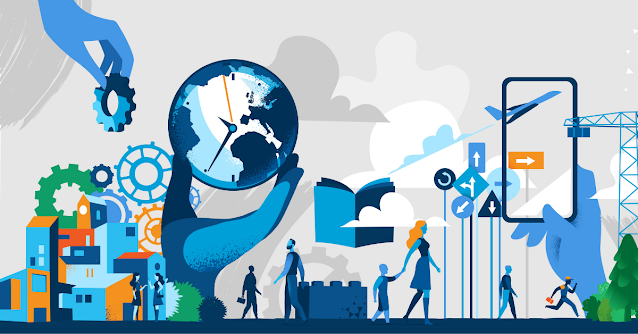The way organizations run is changing as a result of technical breakthroughs in the quickly changing digital environment of today. Diverse cutting-edge technologies, like blockchain, virtual reality, and artificial intelligence, are altering sectors and opening up new possibilities for growth and innovation. In this post, we'll examine some of the most popular technologies and their substantial effects on many industries' businesses.
1. 1. Business Processes
Are Being Revolutionized by Artificial Intelligence (AI)
1.1 Knowledge of AI and Its Applications
Artificial intelligence, sometimes known as AI, is the programming of robots to think, learn, and solve problems similarly to humans. The use of AI into business procedures is improving decision-making, streamlining operations, and improving consumer experiences. AI is transforming how businesses run, from chatbots answering customer questions to predictive analytics supporting data-driven choices.
1.2 The Function of AI in Customer Engagement and Personalization
Customer engagement strategies are being redefined by AI-powered customization. Businesses can customize their products to individual preferences through data analysis and pattern recognition, boosting consumer happiness and loyalty. The seamless and round-the-clock customer service offered by AI-driven chatbots and virtual assistants is further boosting brand-consumer relationships.
2. Making Use of the Internet of Things (IoT) to Improve Connectivity
2.1 Knowledge about IoT Ecosystem
The network of networked devices that gather and exchange data online is known as the Internet of Things (IoT). With the help of this technology, a network of interconnected smart devices is being built, allowing for real-time data monitoring and analysis. IoT is enhancing productivity and efficiency in the commercial world.
2.2 Using IoT to Improve Supply Chain and Logistics
By enabling real-time visibility into inventory, shipping status, and warehouse conditions, IoT is revolutionizing supply chain management. This degree of transparency improves the effectiveness of the supply chain, lowers expenses, and lessens delays. The condition of items during transportation is also monitored by IoT-enabled sensors and devices, ensuring quality and safety.
3. Blockchain is challenging established business models.
3.1 Blockchain Operation
Blockchain is a decentralized, distributed ledger technology that securely and openly logs transactions across numerous computers. For sectors like finance, healthcare, and supply chain, it offers immutability, security, and transparency.
3.2 Blockchain Enhances Security and Trust
Blockchain is a potent tool for increasing data security and creating trust between companies and their customers because of its tamper-proof nature. Blockchain-powered smart contracts automate and enforce agreements, doing away with the need for middlemen and cutting down on transaction costs.
4. User Experiences are Being Transformed by Augmented Reality (AR) and Virtual Reality (VR)
4.1 Closing the Digital and Physical Worlds Gap
Virtual reality (VR) and augmented reality (AR) technologies combine the real world and the virtual world to give users immersive experiences. While VR builds totally synthetic worlds, AR adds digital overlays to real-world settings to improve them.
4.2 A.R. and VR Programs for Business
Retail, travel, and education are just a few of the areas that AR and VR are transforming. These technologies are being used by businesses to provide virtual product try-ons, interactive museum tours, and virtual training sessions, increasing user engagement and boosting revenues.
5. The Influence of Analytics and Big Data
5.1 Utilizing Data to Gain Business Insights
There is a wealth of information now thanks to the Big Data era. However, organizations must use modern analytics tools and processes in order to benefit from this data.
5.2 Predictive Analysis and Data-Driven Decision Making
Businesses can use Big Data and
analytics to make wise decisions based on information-driven insights.
Predictive analysis assists in trend identification, customer behavior
forecasting, and company strategy optimization.
These cutting-edge technologies will continue to drastically alter the corporate landscape as we move forward. Businesses need to adapt to these developments if they want to stay competitive and relevant, from AI-powered automation to blockchain's disruptive potential. Adopting these technologies will increase operational effectiveness, provide new opportunities, and improve consumer experiences.
FAQs
What are the principal advantages of applying AI in business?
Business may gain a lot from AI, including increased productivity, better personalisation, increased consumer engagement, and data-driven decision-making.
How does supply chain management get improved by the Internet of Things?
Real-time visibility into inventory and shipment status made possible by the IoT enables firms to streamline logistics, cut costs, and guarantee product quality while in transit.
Can blockchain technology be used outside of the financial sector?
Yes, blockchain has applications in a variety of sectors, including those where security, transparency, and trust are crucial, including healthcare, supply chains, real estate, and more.
Which fields can augmented reality (AR) and virtual reality (VR) help?
AR and VR can improve user experiences and open up new engagement opportunities for sectors including retail, tourism, education, gaming, and architecture.
How can firms successfully use big data?
Advanced analytics can be used by businesses to use Big Data to generate useful insights, optimize operations, and make data-driven decisions for long-term growth.










0 Comments